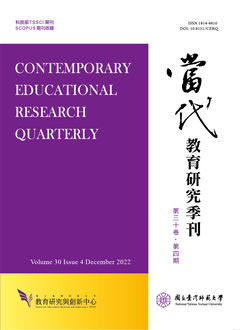

研究目的
本研究旨在運用 J. Bruner 理論中關於兒童語言學習概念,探討其對外語教學和其下之次領域文化情境語言教學之啟示。
研究設計/方法/取徑
Bruner 的研究中,對 20 世紀初語言學習理論(如操作制約學習)進行反思,提出見解,認為兒童在對話互動中習得語言,強調語言的認知學習過程,另撰文探討語言的文化情境和教學方法。過往 Bruner 研究大多關注母語學習,鮮少以 Bruner 理論探討外語學習與文化情境語言溝通。近年學者發現 Bruner 理論蘊含互動性語言教學與文化情境的語言使用概念,能連結外語學習與教學方法。因此,本研究先從近代外語言教學發展史與 Bruner 語言學習論對照探討,將外語教學置入 Bruner 理論的脈絡中,其次剖析 Bruner 理論中,語言學習的文化情境議題。再者,本研究思考 Bruner 理論對外語與文化情境語言教學的啟示。
研究發現或結論
研究發現 Bruner 語言認知學習理論能闡釋外語教學發展史中教學流派變換迭起之趨勢,突顯外語教學法之脈絡。Bruner 觀察兒童在語言互動中學習文化,亦或能推展至外語的文化情境教學,有助於文化情境語言教學。
研究原創性/價值
研究結果發現,Bruner 之真實生活情境進行遊戲和對話活動的想法有助於學生的語言和文化情境學習。
教育政策建議或實務意涵
本論文對照 Bruner 理論與外語教學理論,提出互動式和活動為主的教學法之外語教學實務建議,也為文化情境的整合教學實務提供見解。
Purpose
This study applies the theoretical concepts on children’s language learning by J. Bruner to explore its implications for foreign language teaching and its subfield of pedagogy for cultural context in language learning.
Design/methodology/approach
Bruner’s research reflects on early 20th-century language learning theories (such as Behaviorism-informed learning), providing insights on how children acquire language through dialogue and interactions. It emphasizes the cognitive learning process of language and discusses cultural context in language use and pedagogy. Previously, research on Bruner mostly scrutinized mother tongue learning, and few explored foreign language learning and cultural context pedagogy. Recently, scholars have discovered that Bruner’s theory includes interactive language teaching while exploring the cultural context of language use, and is furthermore able to connect foreign language learning and teaching methods. Therefore, this study first compares the historical development of modern foreign language teaching methods with Bruner’s language learning theory, placing foreign language teaching under the framework of Bruner’s theory, and then analyzes how his theory deals with cultural context in language learning. This study considers the implications of Bruner’s theory for foreign language and cultural context pedagogy in language teaching.
Findings/results
The study found that Bruner’s theory of language cognition can elucidate the trends of teaching method shifts throughout the history of foreign language teaching, highlighting the context of language teaching methodologies. Bruner’s observation of how children learn culture through language interaction can also be extended to cultural context pedagogy in foreign languages, which helps learning about cultural contexts in language.
Originality/value
The study found that Bruner’s ideas of games and dialogue activities in real-life contexts are helpful for students’ language and cultural context learning.
Implications for policy/practice
This paper compares Bruner’s theory with foreign language teaching theory, offering practical suggestions for interactive and activity-based foreign language pedagogy practices, and providing insights for integrating cultural context in teaching practices.

本著作係採用創用 CC 姓名標示-非商業性 3.0 台灣 授權條款授權.
本刊國立台灣師範大學教育研究與創新中心
106台北市和平東路一段162號 | 電話: 02-7749-3670 | E-mail: cerecerq@gmail.com
教創中心 | 師大 | 電子報 | 線上投審系統
本刊由國家科學及技術委員會人文社會科學研究中心補助經費
© 2014 CERI-NTNU
